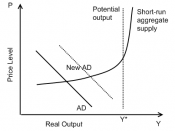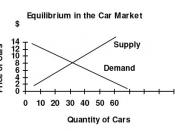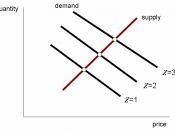In beginning the University of Phoenix's Principles of Microeconomics, the ECON365 course, it is necessary to be able to comprehend the terminology. Key basic concepts include terms, economics, microeconomics, law of supply, and law of demand. By developing a thorough understanding of what each term is, one can begin to discuss the principles of microeconomics more accurately and efficiently. This paper will use the article Supply and Demand by Conant, 2006, the 2008 article Overview: Microeconomics written in Everyday Finance: Economics, Personal Money Management, and Entrepreneurship, and the textbook Economics, 7e by Colander, 2008 to help the reader grasp a further understanding of the difference between economics and microeconomics and what is meant by supply and demand.
EconomicsEconomics is defined as, "the study of how human beings coordinate their wants and desires, given the decision-making mechanisms, social customs, and political realities of the society" (Colander, 2008). Colander, 2008 explains that coordination is a key word in the definition of economics because it has three separate references; "what, and how much, to produce, how to produce it, for whom to produce it"(Colander, 2008).
These coordination questions are simple on paper, but are more complicated because they are being asked of and answered to every individual and each entity in the world. The problem results in the explanation that because peoples' wants are endless, but they are limited in what is available to them. This realization results in the complication that all economies face the problem of scarcity, "the goods available are too few to satisfy individuals' desires"(Colander, 2008).
It is currently possible to regulate the needs and wants of all individuals in the world through the aid of technology and technological advances such as the Internet, but because of political strains, economics is divided in its studies. "The field of...


